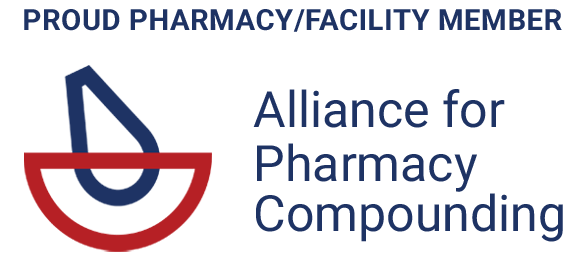What is compounding?
Compounding is a specialized procedure carried out by licensed pharmacy professionals to prepare medications for patients who have prescriptions from their medical providers, especially when no commercially available medication can fully meet their specific needs.
For instance, if a patient requires a dosage, formula, flavor, or strength that is not readily available in the market, or if there is a nationwide shortage of a commercially available drug, a compounding technician or pharmacist can create that medication with a prescription from the patient’s healthcare provider.
It is important to be aware that compounded medications undergo preparation without evaluation by the Food and Drug Administration (FDA). Therefore, while the ingredients used in compounding are sourced from FDA-inspected facilities, the final compounded medication itself is not evaluated by the FDA.
What is the difference between medications manufactured by a pharmaceutical company and compounded medications?
Pharmaceutical companies produce commercially available drugs in large quantities, with predetermined forms, strengths, dosages, and flavors to cater to the general population. These drugs are FDA-approved based on large scale studies and testing, ensuring their safety and efficacy.
On the other hand, compounded medications are specially ordered by qualified healthcare providers and prepared by compounding pharmacies to meet the unique medical requirements of individual patients. View Valiant’s disclaimer for more information.
Why do medications need to be compounded?
By obtaining a prescription from a doctor, a compounding pharmacist or technician can formulate a personalized strength or dosage of a medication. This flexibility allows them to modify a dosage form to improve compliance, such as creating a liquid version for individuals who struggle with swallowing pills. Furthermore, the compounding process allows pharmacists to formulate medications without non-essential components such as dyes, gluten, sugar, lactose, or preservatives. This customization proves valuable for patients with specific dietary restrictions or allergies.
Another advantage of compounding is the option to add more pleasing flavors to certain medications, making them more palatable and increasing patient compliance with their prescribed medication.
Is compounding legal?
Yes, compounding is legal and regulated by state boards of pharmacy. Compounding pharmacies must adhere to strict quality standards to ensure patient safety.
How do I obtain compounded medications?
To receive compounded medications, you need a valid prescription from a licensed healthcare provider, such as a doctor, dentist, or veterinarian. Some doctors have limitations on what may be prescribed, which may vary from state to state. Prescriptions to Valiant Compounding Pharmacy can be submitted by healthcare professionals online.
What Non-Sterile dosage forms does Valiant offer?
Oral Dosage Forms
- Sublingual tablets
- Troches/Lozenges
- Capsules
- Suspensions
- Solutions
- Lollipops
Topical Dosage Forms
- Creams
- Gels
- Ointments
- Nasal sprays
- Suppositories
What is Beyond Use Date (BUD)?
The Beyond Use Date (BUD) refers to the date after which Valiant Compounding Pharmacy cannot assure the stability or sterility of the medication. This date is calculated starting from the day the medication is compounded. It is essential to adhere to the BUD to ensure the safety and efficacy of the compounded medication.
You should not use a compounded prescription beyond the labeled use date.
Please call 1-855-GOO-BLUE to speak with a pharmacist for any additional questions.
Can compounding pharmacies create medications in various forms?
Yes, compounding pharmacies can produce medications in various forms, including creams, gels, liquids, capsules, suppositories, and more, based on the patient’s preferences and needs.
Are compounded medications covered by insurance?
Insurance coverage for compounded medications varies depending on the specific insurance plan. Patients should check with their insurance provider to determine coverage details.
Can compounding pharmacies compound medications for pets?
Yes, compounding pharmacies can create medications specifically tailored for pets based on their unique requirements, such as dosage, flavor preferences, size, and species.
Are there any limitations to compounding medications?
While compounding offers significant customization, there are certain restrictions and regulations that must be followed. For example, compounding pharmacies cannot create copies of FDA-approved medications or engage in mass production of compounded drugs without valid reasons.

